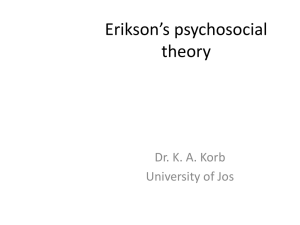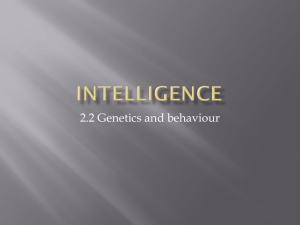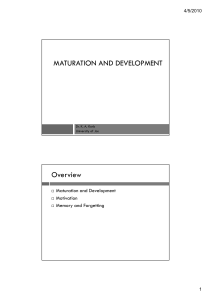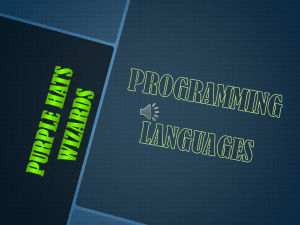Cognitive Abilities
advertisement
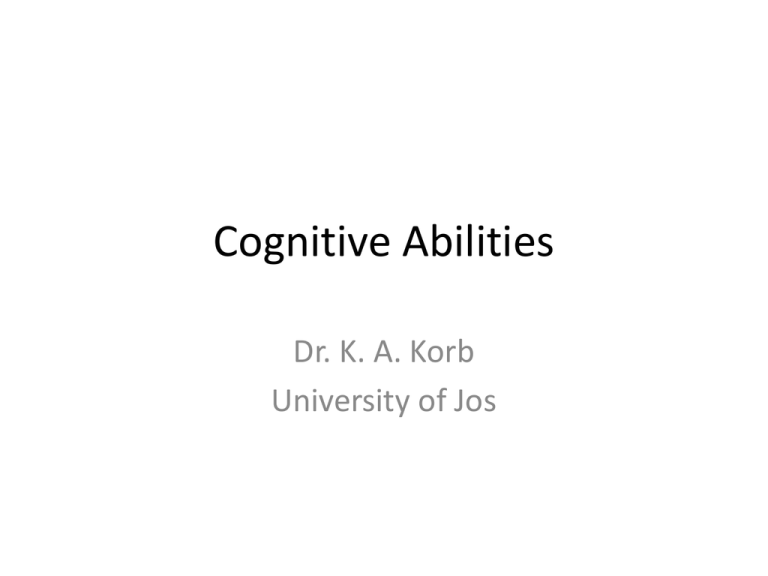
Cognitive Abilities Dr. K. A. Korb University of Jos Outline • • • • Theory of Intelligence Intelligence Testing Influences on Intelligence General Issues in Intelligence Dr. K. A. Korb University of Jos Hierarchical Theory of Intelligence General Intelligence Fluid Intelligence Inductive Reasoning Quantitative Reasoning Dr. K. A. Korb University of Jos General Memory Crystallized Intelligence Sequential Reasoning Reading Comprehension Memory Span Spelling Ability Phonetic Coding Etc. Learning Ability Free Recall Memory Hierarchical Theory of Intelligence • Fluid Intelligence: Reason abstractly on novel problems – Deductive Reasoning – Inductive Reasoning – Quantitative Reasoning • Crystallized Intelligence: Accumulation of knowledge and skill in familiar domains – Vocabulary – Information about culture Dr. K. A. Korb University of Jos Implications • Students who tend to do well in one class tend to do well in other classes • We need to teach both reasoning skills and crystallized knowledge in all domains Dr. K. A. Korb University of Jos Intelligence Testing • Alfred Binet – Studied animal magnetism – Scientific embarrassment influenced strict empiricism – Created first intelligence test to identify children who would not profit from instruction Dr. K. A. Korb University of Jos Intelligence Testing Mental Age • Intelligence Quotient: Mental Age Chronological Age x100 25 20 15 10 5 0 125 100 75 0 Dr. K. A. Korb University of Jos 5 10 Chronological Age 15 20 Intelligence Testing • Deviation IQ: Statistical comparison to others in group Purpose: Compare child’s performance to others in similar circumstances Dr. K. A. Korb University of Jos Influences on Intelligence • Genetics • Environment – Children: Genetics influences about ½ of differences in intelligence – Adults: Genetics tends to account for more differences Biology Nutrition Lead Parental alcohol consumption Perinatal Factors Dr. K. A. Korb University of Jos – – – – Cultural experiences Family environment Schooling Occupation Genetics vs. Environment Genetics 50% Dr. K. A. Korb University of Jos Environment 50% Implications • The environment has substantial influence over intelligence, so create a classroom environment that fosters high intelligence – Reading – Ask students to solve new problems – Ask students deep questions Dr. K. A. Korb University of Jos General Issues for Intelligence • • • • • Ubiquitous: Wide-spread Multivariate: Multiple components Increases with age and experience The Flynn Effect Is education’s most important: – Raw material – Product Dr. K. A. Korb University of Jos Importance of Intelligence • Correlates with: – School performance – Years of education • Directionality? – Social status and income • Third variable? – Job Performance – Juvenile Crime (Negative) • Directionality? Dr. K. A. Korb University of Jos Reading Vocabulary Across Grades 400 . 350 Vocabulary 300 99th %-tile 80th %-tile 50th %-tile 20th %-tile 1st %-tile 250 200 150 100 K Dr. K. A. Korb University of Jos 1 2 3 4 5 6 7 Grade 8 9 10 11 12 Flynn Effect: Average IQ over time . 105 IQ on the 1995 Scale 100 95 90 85 80 75 70 1900 1920 1940 1960 Year Dr. K. A. Korb University of Jos 1980 2000 Revision • Explain the hierarchical theory of intelligence, including the difference between fluid and crystallized intelligence. • Describe the three major factors that influence intelligence. • What is the difference between the Intelligence Quotient and the Deviation IQ? • Explain why studying cognitive abilities is important for educators (hint: General Issues for Intelligence) Dr. K. A. Korb University of Jos

